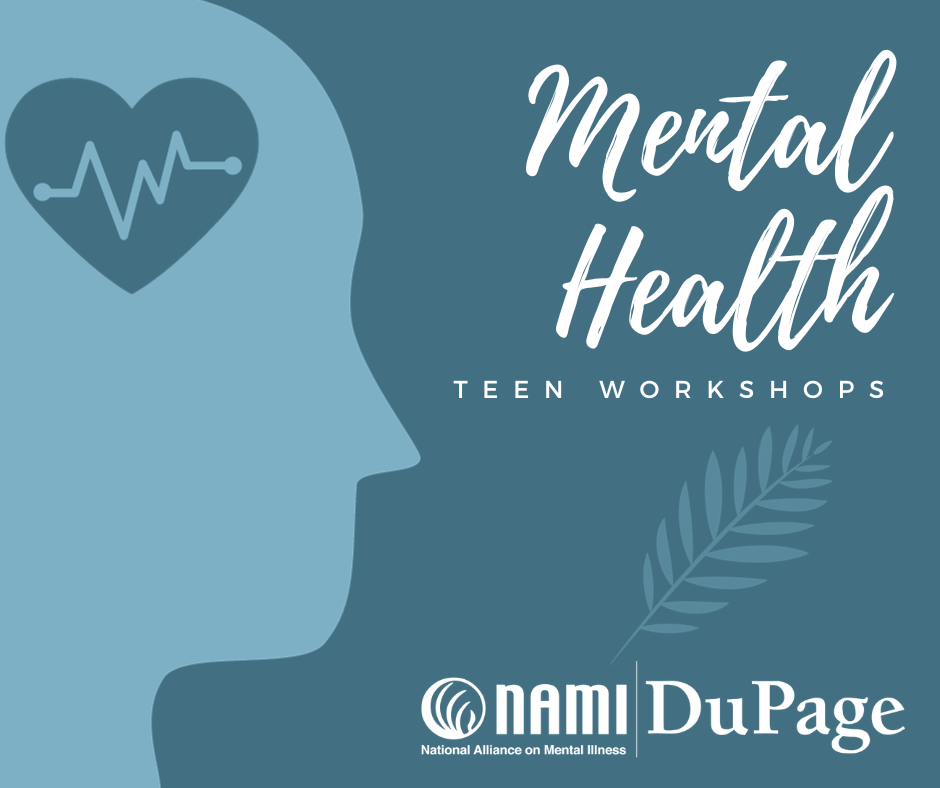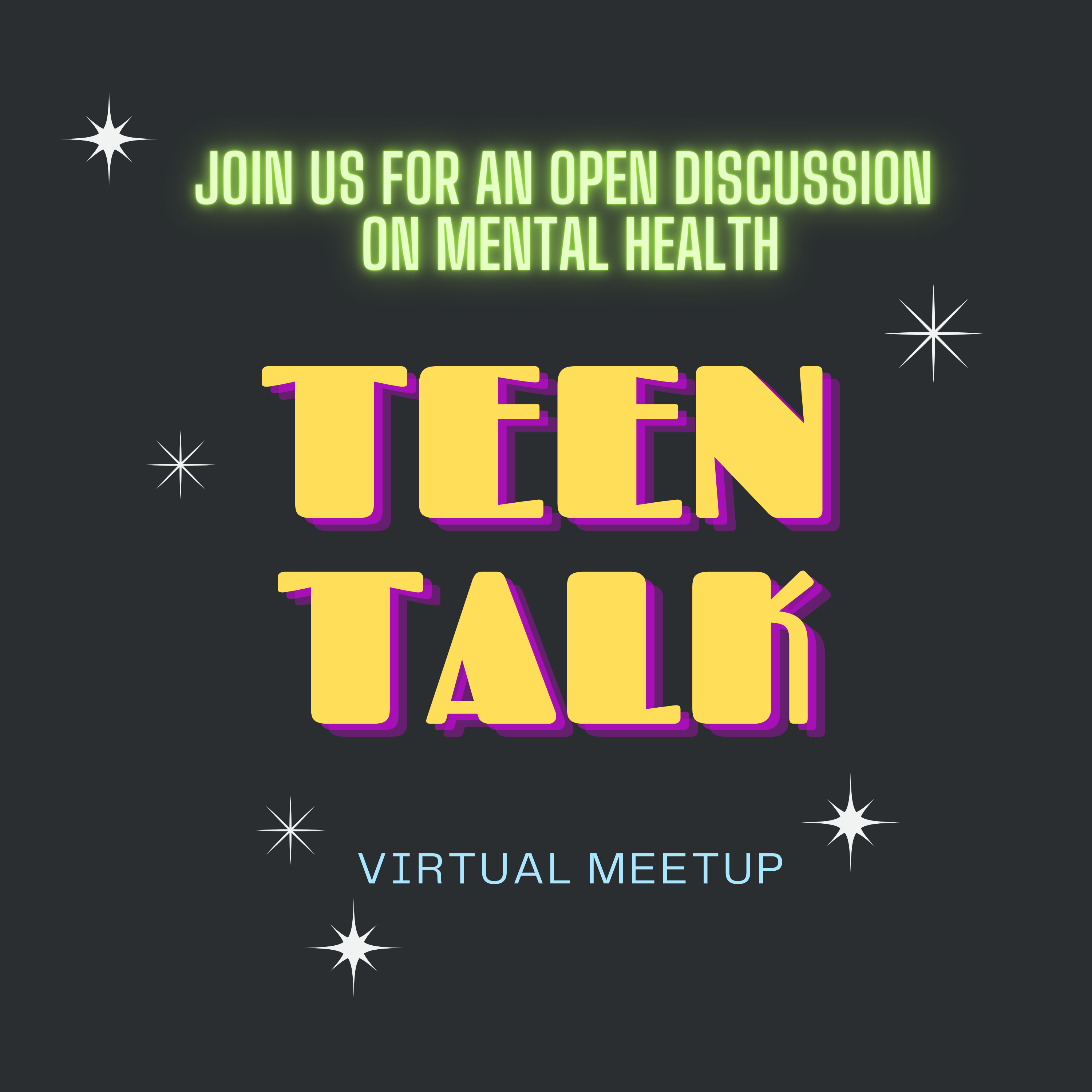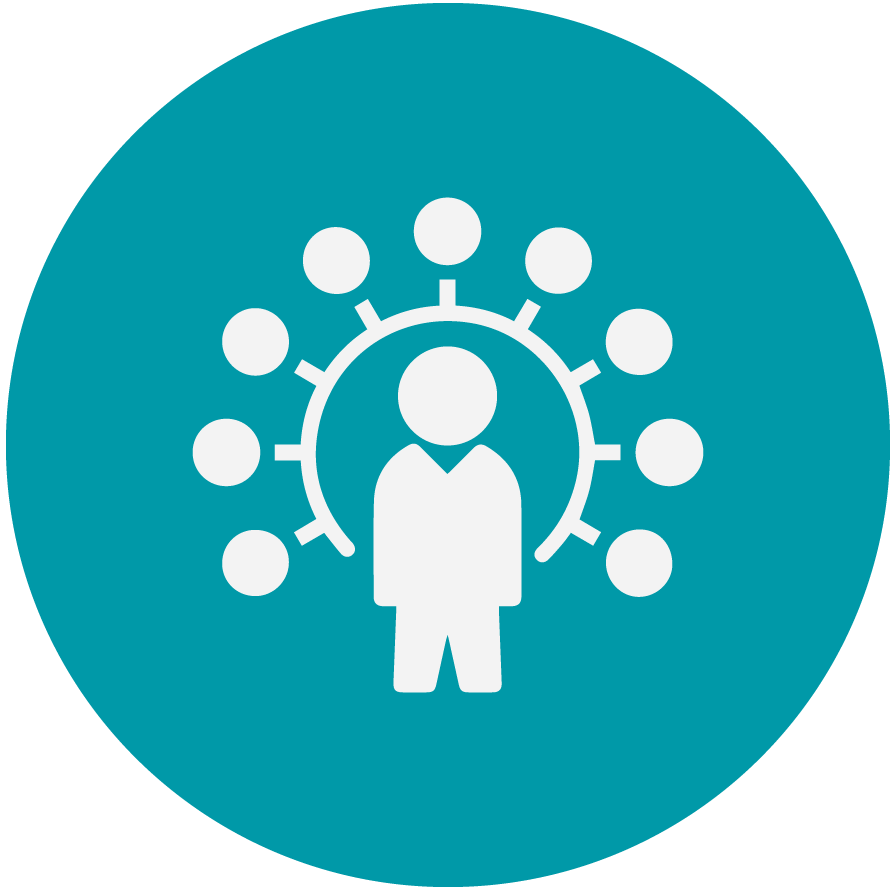Youth Services
For more information about Youth Services, please contact Leigh Nelson, Director of Youth Services, at [email protected], or by phone at (630) 752-0066.

End the Silence, end the stigma
Our youth programs are designed to end the stigma surrounding mental health by providing interactive and educational presentations to DuPage County students, professionals, and families. Our department offers several programs available in both in-person and virtual platforms.
To learn more about our programs, please contact Leigh Nelson, Director of Youth Services, at [email protected], or Karen Rosenberg, Youth Program Coordinator at [email protected].
Ending the Silence Programs
Our Ending the Silence (ETS) education programs were created here at the NAMI DuPage local affiliate to provide mental health educational presentations to students, parents and school staff. Since its inception in 2007, it has since been recognized and adopted by NAMI National, and is now presented by NAMI affiliates across the country. School health class programs have seen rapid growth and outreach, and Ending the Silence continues to expand and educate the youth of America one school at a time. Currently, NAMI DuPage regularly visits over half the middle and high schools in DuPage County.

Other Youth Programs:
- Jump Into Mental Health: 50-minute interactive program designed to give 5th and 6th grade audiences an introduction to mental health. A trained facilitator explains the difference between everyday feelings and overwhelming feelings, coping mechanisms, healthy habits, and how students can get help for themselves or their friends.
- Ending the Silence 101: 50-minute presentation designed for 7th and 8th grade audiences. The students will learn about warning signs, facts and statistics, and how to get help for themselves or a friend.
- Ending the Silence: 50-minute presentation designed for high school students that includes warning signs, facts and statistics, and how to get help for themselves or a friend.
- Ending the Silence – School Staff: 1-hour presentation for school staff members that includes information about warning signs, facts and statistics, how to approach students, and how to work with families.
- Ending the Silence – Families: 1-hour presentation for adults with middle or high school-aged youth that includes warning signs, facts, and statistics, how to talk with your child, and how to work with school staff.
Teen Support Group
NAMI DuPage is proud to offer a free peer support group for 8th grade to 12th grade teens with mental health issues. Co-led by a NAMI peer leader and a clinician, this is held in person at NAMI DuPage. We hope to provide a safe space for peers to learn about mental health and support and encourage each other in their circumstances.*
Participants must be registered and screened, and a parent/guardian and teen orientation is also necessary to review any questions before starting the group.
To get started, click on the Contact form below.
Teen Support Group will not be held on June 27th and July 4th. We apologize for any inconvenience.
When: Every Thursday
Time: 7:00 pm – 8:30 pm
Where: 115 N County Farm Road, Wheaton
Parent Support Group
On hold for the summer.
When: 1st and 3rd Thursdays of the month
(Meets at the same time as the Teen Support Group)
Time: 7:00 pm – 8:30 pm
Where: 115 N County Farm Road, Wheaton

Request for contact
To be contacted about our Teen Support Group, please complete the required information below and a member of our team will contact you!
*PLEASE NOTE: The co-facilitators are mandated reporters. For a teen’s safety, if any cases of alleged abuse or neglect of a teen or someone in their household is disclosed, it will be reported to relevant authorities.
Teen Newsletter - Sign Up here!
To sign up for our Teen Newsletter, please complete the required information below.

Teen Workshops
NAMI DuPage is pleased to offer workshops for teens! Participants will walk away with exercises and tools they can practice themselves. Our interactive workshops are tailored for each audience.
- Stress Less
- Social Media Survival Guide
- Nervous Sweats: Social Anxiety
- Relationship Goals
- Understanding Anxiety and Depression
- That’s Not Who I see in the Mirror: Body Dysmorphia
- Navigating Tough Stuff: Supporting Friends with Suicidal Ideations
- Singled Out: Racism and Mental Health
- ETS 200
Teen Talk Forum
A spin-off of “Ending the Silence,” this group is just for high school teens like you! It’s a safe and welcoming space where you can freely talk about mental health and your everyday struggles. While two adults are there to help guide the discussion, most of the chat is up to you and your fellow teens. It’s a chance to vent and share with friends who understand what you’re going through. 😊👫🗣️

Want to host a Workshop or Teen Talk of your own?
Interested in hosting a workshop for middle or high school students? Please complete the below Workshop Request form, and a member of our team will be in touch!
Workshop Request Form (Click Here)
Mental Health FAQ For Teens
How do you get a mental illness?
There’s a lot we still don’t understand about what causes mental illness. In general, doctors think mental illness is caused by a combination of a variety of biological and environmental factors, such as:
- Inherited traits: Mental illness is more common in people who have a biological family member with a mental illness. You may already have a genetic vulnerability to developing a mental illness, and a stressful or traumatic life experience may trigger the actual illness itself.
- Biological factors: In addition to inherited traits, outside forces have been linked to mental illness—for example, traumatic brain injury or exposure to viruses or toxins while in the womb.
- Life experiences: Sometimes challenges or traumatic experiences in your life, such as the loss of a loved one, being assaulted or prolonged high stress can play a role in triggering mental illness. Other life experiences that leads to low self-esteem or a history of sexual or physical abuse can also be a factor. Certain life experiences can also lead to unhealthy patterns of thinking linked to mental illness, such as pessimism or distorted ways of thinking.
- Brain chemistry: Referred to as biochemical causes, and are changes which occur in the brain and are thought to affect mood and other aspects of mental health. Naturally occurring brain chemicals called neurotransmitters play a role in some mental health conditions. In some cases, hormonal imbalances can affect mental health. Doctors think that inherited traits, life experiences and biological factors can all affect the brain chemistry linked to mental illnesses.
Can mental illnesses be cured?
At this time, there is no cure for mental illness. But there are many very effective treatments such as medication and psychotherapy. With appropriate treatment and support, recovery is not only possible, but highly likely.
I have a friend who is showing signs of depression. What should I do if they don't want to ask anyone for help?
Continue to urge your friend to seek help. Facing that you might have mental health issues can be very challenging for many reasons. You could offer to go with him to talk to someone. There are also several websites and phone numbers on the NAMI website that your friend can use to get information and support anonymously.
Why doesn’t depression just go away?
When depression continues over a period of time, you may need help to deal with it effectively. It is not something that we can will ourselves out of and into recovery. Additionally, it may take some time to find good interventions like medication and the right type of psychotherapy to create an effective treatment plan.
What if my parents don’t believe me when I say I am depressed or experiencing other symptoms of mental illness?
Don’t stop trying to talk to them. But know that it’s not that they don’t care about you. They likely don’t have the education that you and your friends are getting in health class and might not fully understand. You could try talking to a counselor or anyone at your school, your doctor or another adult in your life.
My friend is very depressed, but made me promise not to tell their parents. What can I do?
You can encourage her to talk to another adult such as a teacher, coach or counselor. There are also several websites and phone numbers listed on our NAMI DuPage website that you and your friend can use to get information on how to receive support anonymously. If your friend mentions having suicidal thoughts, talk to them about it and listen without judgment; but most importantly, TELL a trusted adult as soon as possible. It is not a betrayal of your friendship to get help for your friend during this critical time. Always remember to ACT:
A – Acknowledge your friend is suffering
C – Care by telling that you are concerned for their well-being, and
T – Tell a trusted adult immediately.
Does everyone who has a mental health condition need to take medication?
No, but many people find that a combination of medication and psychotherapy works best for them or their loved one. There are also many alternative types of treatment for mental illness. Sometimes people are able to manage their illness through coping skills and a strong support network. However, it’s best to discuss your options with your doctor and determine your treatment plan together.
If you’re prescribed medication, will you have to take it for the rest of your life?
It depends on the individual, the severity of their symptoms and whether or not other forms of treatment are effective at helping the individual manage their symptoms. The decision to stop taking medication is definitely one that should only be made in consultation with your doctor.
Many people try stopping their medication when they begin to feel better—but often the symptoms come back. With mental illness, many people learn that if they feel better, it just means they have found the right treatment combination, and if they want to keep feeling better, they need to continue taking their medication.
How early / late in life can people get a mental illness?
About half of all individuals with mental illness began to show symptoms by age 14. Sometimes people can start to show signs as early as four or five. With about 75 percent of all individuals beginning to show symptoms by age 24, it is most common for mental illness to begin sometime before an individual reaches their late 20s. However, although people might start experiencing symptoms early in life, it commonly takes many years, even decades for some people to seek treatment. Early intervention makes for easier friendships, school work, and family life.



